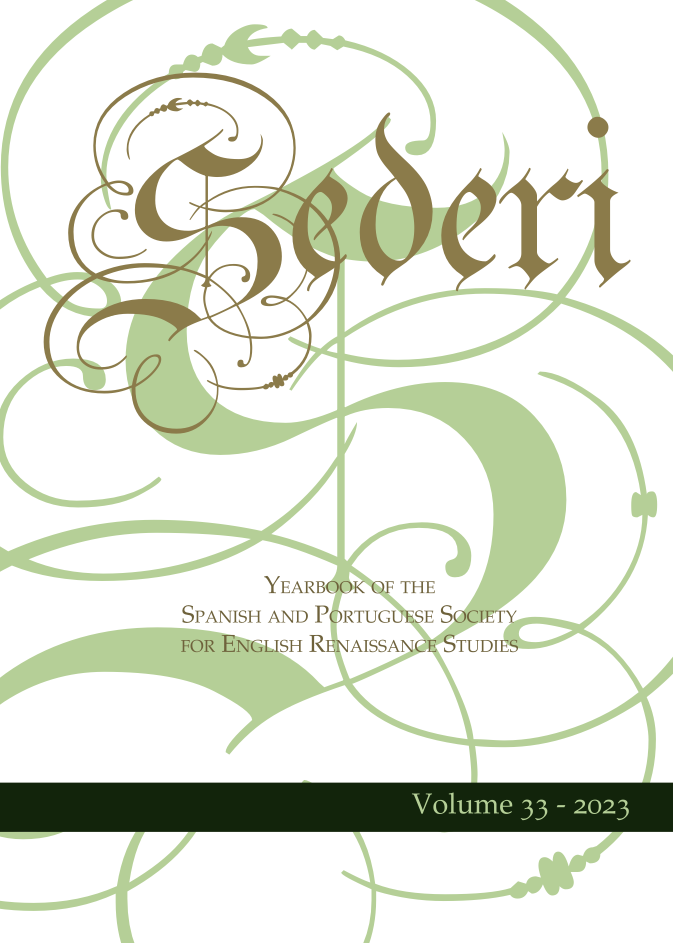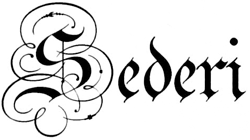
Sederi 33
Sederi 33 — 2023
EDITOR
Marta Cerezo Moreno
MANAGING EDITOR
Isabel Guerrero Llorente
REVIEW EDITOR
Miguel Ramalhete
PRODUCTION EDITORS
David J. Amelang
Tamara Pérez-Fernández
ISSN 1135-7789
Susana P. Magalhães Oliveira, “Emotions and early modern diplomacy: The case of Iberian ambassadors at the Elizabethan court.” SEDERI 33 (2023): 9–31.
DOI: https://doi.org/10.34136/sederi.2023.1 Download PDF
Abstract
Emotions underlie world politics and are essential to state actors’ strategies and exchanges. Considering the complexities of the early modern Anglo-Iberian relations and the diplomatic sources, it is possible to pursue a line of enquiry which analyzes emotions in foreign affairs policies. This paper explores the Iberian diplomatic missions to the Elizabethan court, applying the current research on emotions in diplomacy to the sixteenth century diplomatic practice and its conventions regarding emotional display. Early modern Iberian diplomatic correspondence reveals a collective dimension, conveying an official—rather than personal—emotional strategy on foreign affairs. Spain’s dominant geopolitical and economic circumstances favored a more aggressive diplomatic approach. At the same time, Portugal’s more delicate strategic position and the maintenance of the Anglo-Portuguese Alliance determined a diplomacy of appeasement. Sovereigns selected their envoys based on how their diplomatic skills and emotional behavior would suit the kingdom’s agenda. This diplomatic strategy allowed a collaborative and synchronized emotional behavior amongst state actors to emerge.
Keywords: emotions, diplomacy, early modern era, Anglo-Iberian relations.
References
Primary sources
Manuscript sources
Lisbon:
Arquivo Nacional da Torre do Tombo, PT/TT/CC/1/103/61.
Biblioteca da Ajuda, Palácio Nacional da Ajuda, MS 49-X-4, Vol. IV. fols. 123–125v.
London:
British Library, Landsowne MS 23.58, fols. 121, 122,
British Library, Harley MS 6798.
The National Archives, SP 70/58.
Printed sources
Butler, Arthur John, ed. 1907. Calendar of State Papers Foreign: Elizabeth, Volume 15, 1581–1582. London: His Majesty’s Stationery Office.
Callières, François de. 1716. De la manière de négocier avec les Souverains: de l’utilité des négociations, du choix des ambassadeurs et des envoyez, et des qualitez necessaires pour réussir dans ces emplois. Amsterdam: pour la Compagnie.
Cardoso, Jerónimo. 1592. Dictionarium latino lusitanicum et vice versa lusitanico latinum. Lisboa: Alexandre Sequeira.
Covarrubias Orozco, Sebastián de. 1674. Tesoro de la lengua castellana, o española. Madrid: Melchor Sanchez.
Hotman, Jean. 1603. The Ambassador. London: James Shawe.
Hume, Martin A. S., ed. 1892. Calendar of Letters and State Papers Relating to English Affairs Preserved Principally in the Archives of Simancas, Vol. I. New York: Cambridge University Press.
Hume, Martin A. S., ed. 1894. Calendar of Letters and State Papers Relating to English Affairs Preserved Principally in the Archives of Simancas, Vol. II. New York: Cambridge University Press.
Hume, Martin A. S., ed. 1896. Calendar of Letters and State Papers Relating to English Affairs Preserved Principally in the Archives of Simancas, Vol. III. New York: Cambridge University Press.
Machado, Diogo Barbosa de. 1737. Memorias para a historia de Portugal, que comprehendem o governo del rey D. Sebastião único em o nome, e décimo sexto entre os monarchas portuguezes do anno de 1554 até o anno de 1561. Dedicadas a elrey D. João V: Tomo I. Lisboa: Joseph Antonio da Sylva, Academia Real.
Nicholson, William, ed. 1843. The Remains of Edmund Grindal. Cambridge: University Press.
Stevenson, Joseph, ed. 1865. Calendar of State Papers Foreign: Elizabeth, Volume 2, 1559–1560. London: Her Majesty’s Stationery Office. British History Online. Accessed September 29, 2022. http://www.british-history.ac.uk/cal-state-papers/foreign/vol2/vii-cxiv.
Vera y Figueroa, Juan Antonio de. 1620. El enbaxador. Sevilla: Francisco de Lyra.
Wicquefort, Abraham de. 1689. L’Ambassadeur et ses Fonctions, Vol. 2. Cologne: Chez Pierre Marteau.
Secondary sources
Anderson, Roberta and Charlotte Backerra, eds. 2021. Confessional Diplomacy in Early Modern Europe. London: Routledge.
Averill, James R. 1996. “An Analysis of Psychophysiological Symbolism and its Influence on Theories of Emotion.” In The Emotions: Social, Cultural and Biological Dimensions, edited by Rom Harré and W. Gerrod Parrott. London: Sage Publications.
Barclay, Katie. 2021. “State of the Field: The History of Emotions.” The Journal of the Historical Association 116 (4): 456–66.
Bell, Gary M. 1976. “John Man: The Last Elizabethan Resident Ambassador in Spain.” The Sixteenth Century Journal 7 (2): 75–93.
Bell, Ilona. 2010. Elizabeth I: The Voice of a Monarch. New York: Palgrave Macmillan.
Bradberry, Travis, and Jean Greaves. 2009. Emotional Intelligence 2.0. San Diego: Talent Smart.
Carles, Nathalie Rivère de, ed. 2016. Early Modern Diplomacy, Theatre and Soft Power: The Making of Peace. London: Palgrave Macmillan.
Crawford, Neta C. 2000. “The Passion of World Politics: Propositions on Emotion and Emotional Relationships.” International Security 24 (4): 116–56.
Damásio, António. 1995. O Erro de Descartes. Lisboa: Europa América.
Daybell, James, and Svante Norrhem, eds. 2017. Gender and Political Culture in Early Modern Europe, 1400–1800. London: Routledge.
Dixon, Thomas. 2012. “‘Emotion’: The History of a Keyword in Crisis.” Emotion Review: Journal of the International Society for Research on Emotion 4 (4): 338–44.
Dolan, Frances E. 2003. “Gender and Sexuality in Early Modern England.” In Gender, Power and Privilege in Early Modern Europe, edited by Jessica Munns and Penny Richards, 7–21. London: Pearson.
Fernández Fernández, Víctor. 2022. “Guzmán de Silva and Elizabeth I: A Diplomacy of Emotion.” SEDERI 32: 67−86.
Flor, Fernando R. de la. 2005. Pasiones Frías: Secreto y Disimulación en el Barroco Hispano. Madrid: Marcial Pons Historia.
Goffman, Erving. 1959. The Presentation of Self in Everyday Life. New York and London: Doubleday.
Graham, Sarah Ellen. 2014. “Emotion and Public Diplomacy: Dispositions in International Communications, Dialogue, and Persuasion.” International Studies Review 16 (4): 522–39.
Hall, Todd. 2015. Emotional Diplomacy: Official Emotion on the International Stage. Ithaca: Cornell University Press.
Hutchings, Mark. 2021. “Diplomacy Narratives as Documents of Performance.” In Exile, Diplomacy and Texts. Exchanges between Iberia and the British Isles, 1500–1767, edited by Ana Sáez-Hidalgo and Berta Cano-Echevarría, 208–228. Leiden: Brill.
Hutchison, Emma and Roland Bleiker. 2014. “Theorizing Emotions in World Politics.” International Theory 6: 491–514.
Kantorowicz, Ernst H. 1957. The King’s Two Bodies. A Study in Medieval Political Theology. New Jersey: Princeton University Press.
Koschut, Simon, ed. 2020. The Power of Emotions in World Politics. London: Routledge.
Krebs, Ronald R., and Patrick Thaddeus Jackson. 2007. “Twisting Tongues and Twisting Arms: The Power of Political Rhetoric.” European Journal of International Relations 13 (1): 35–66.
Lemée, Emmanuel. 2021. “Harnessing Anger and Shame: Emotional Diplomacy in Early Modern Context.” Diplomatica 3 (1): 1–22.
Magalhães, Joaquim Romero. 1993. “Os Régios Protagonistas do Poder: D. Sebastião, D. António, Filipe II (I de Portugal).” In História de Portugal: No Alvorecer da Modernidade, edited by José Mattoso. Lisbon: Editorial Estampa.
Mattingly, Garrett. 1955. Renaissance Diplomacy. Middlesex and Victoria: Penguin.
Nussbaum, Martha. 2001. Upheavals of Thought: The Intelligence of Emotions. Cambridge: Cambridge University Press.
Nye, Joseph. 2004. Soft Power: The Means to Success in World Politics. New York: Public Affairs.
Nye, Joseph. 2008. “Public Diplomacy and Soft Power.” The ANNALS of the American Academy of Political and Social Science 616 (1): 94–109.
Oliveira, Susana. 2016. “‘The Intolerable Business’: Religion and Diplomacy under Elizabeth’s Rule.” SEDERI 26: 159–74.
Oliveira, Susana. 2021. “Networks of Exchange in Anglo-Portuguese Sixteenth-Century Diplomacy and Thomas Wilson’s Mission to Portugal.” In Exile, Diplomacy and Texts. Exchanges between Iberia and the British Isles, 1500–1767, edited by Ana Sáez-Hidalgo and Berta Cano-Echevarría, 32–54. Leiden: Brill.
Reddy, William M. 2001. The Navigation of Feeling: A Framework for the History of Emotions. Cambridge: Cambridge University Press.
Sowerby, Tracey, and Jan Hennings. 2017. Practices of Diplomacy in the Early Modern World c. 1410–1800. New York, Routledge.
Stevenson, Joseph. 1865. “Preface.” In Calendar of State Papers Foreign: Elizabeth, Volume 2, 1559–1560, edited by Joseph Stevenson, vii–cxiv. London: Her Majesty’s Stationery Office. British History Online. Accessed September 29, 2022. http://www.british-history.ac.uk/cal-state-papers/foreign/vol2/vii-cxiv.
